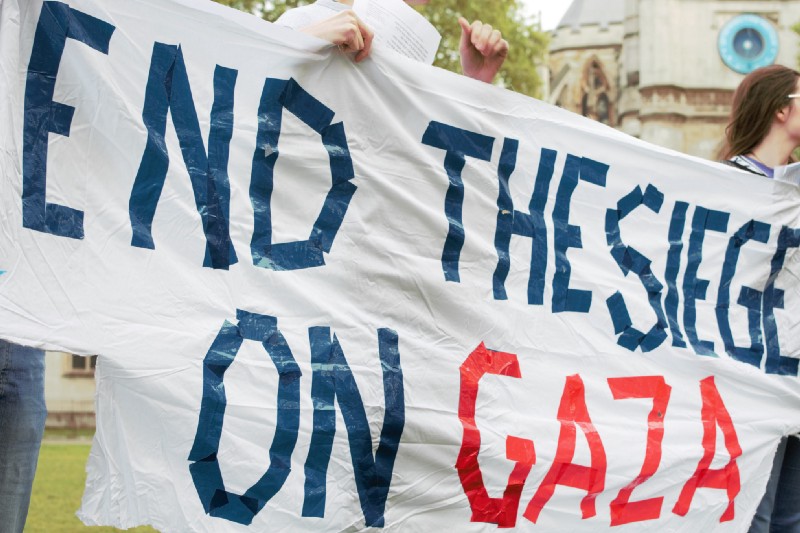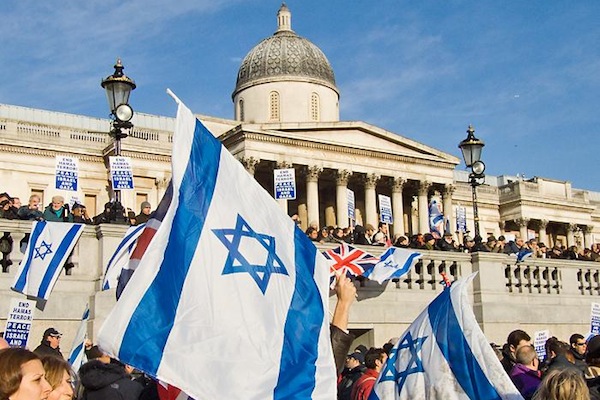Young British Jews are facing a torrent of hatred from their own community for expressing solidarity with Gaza. And yet, more British Jews are struggling to see the values they hold reflected in the Israeli government.
By Rob Abrams

A group of mostly young British Jews took a large step forward in shifting the British Jewish community’s debate on Israel and the occupation this past week. Around 50 British Jews, shocked by the scale of death in Gaza, after Israeli snipers shot dead 60 Palestinians in a single day, gathered in Parliament Square in central London to name the dead and recite the kaddish, the Jewish mourner’s prayer.
Although this certainly wasn’t the first time we have spoken out against the violence unleashed on Gaza, this time felt notably different. Standing among us weren’t just the usual suspects from various left-wing Jewish groups such as the Jewish Socialist Group or Jewdas.. There were community leaders; youth movement counselors, rabbis, and young people engaged in their synagogues and communities.
This is reflective of a massive groundswell of change that has taken place within the community in recent years. Many British Jews, old and young alike, are struggling to see the values they hold reflected in an Israeli government that has long turned its back on them. Among my peers in the community, it is now relatively rare to find anyone not critical in some way of Israel’s treatment of the Palestinian people.
This makes sense. You can only spend so long teaching Jewish children biblical teachings of pursuing justice before they start asking why some in our community seem to interpret this as “justice for some.” Whether theologically correct or not, their Judaism is built on the notion of “justice for all.”
So why have they waited until now to speak out? Because the stick is far bigger than the carrot. As we stood in Parliament Square, we were helpless to prevent a small number of far-right activists from documenting us. Subsequently, the week since has been a disturbing reminder of the following fact; when a British Jew steps out of line, the full weight of the community will fall on them.
We had barely left the square before videos appeared online, published by the Israel Advocacy Network, accusing us of being terrorist sympathizers. Community leaders took the bait and instead of holding dialogue on the issue, the floodgates were opened for a torrent of abuse. The chairman of the Campaign Against Antisemitism publicly described us as a “sickness” and suffering from Stockholm Syndrome, clearly unaware of the ironic connotations of his language. Some, including prominent anti-Palestinian blogger David Collier, called for us to be “named and shamed.” Much of our community was happy to oblige.
Organizers and attendees have since received direct threats. Comments on social media have encouraged us, among other things, to commit suicide. Individuals have been reprimanded in their workplaces and places of study and had their livelihoods threatened. Things got so bad that even Palestinian friends got in touch to express solidarity.
The vitriol has arrived to the point that some senior community figures have now stepped in to call a halt to the abuse. Rabbi Laura Janner Klausner, senior Rabbi of the Reform movement in the UK published an article on the front page of Jewish News this week pleading with those attacking us to stop. It is unlikely that they will heed this call.

Our detractors claim we are desecrating Jewish practice by using the kaddish prayer. In his article against us, Gideon Falter of the Campaign Against Antisemitism recalls the heartbreak felt by those who say this prayer for lost loved ones. As he describes it: “It is a prayer steeped in sadness.” I could not agree more. We undertook an action that was designed to make people feel uncomfortable.
Saying kaddish was an expression of our profound heartbreak at senseless loss of life and a community that seems to have given up on the project of peace and justice in Israel-Palestine. It is all too clear that an end to the suffering in Gaza will continue to be delayed as long as we are too blinded by our own to take brave steps in grappling with the pain and loss of the Palestinian people.
I do not know now if I am more scared of how dark our immediate future looks, or excited by how rattled our opponents are. But now that our faces have been fully exposed, one thing is certain. They can no longer silence us.
Rob Abrams is a Jewish anti-occupation activist from London.
